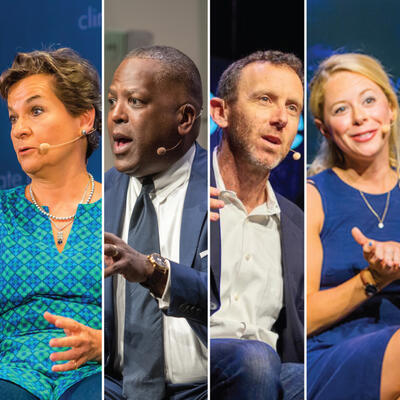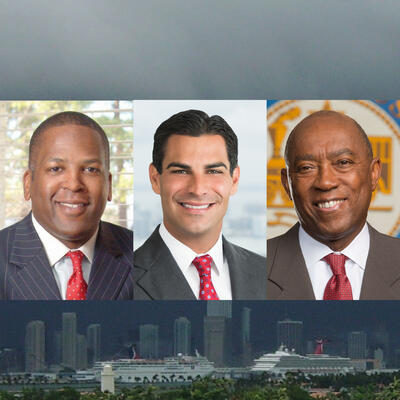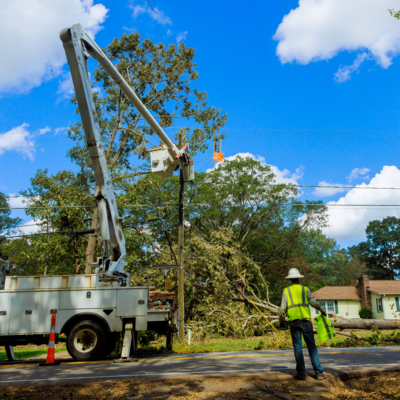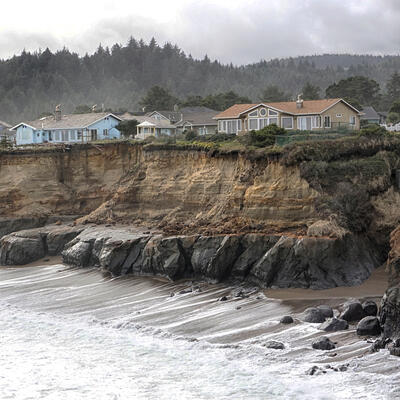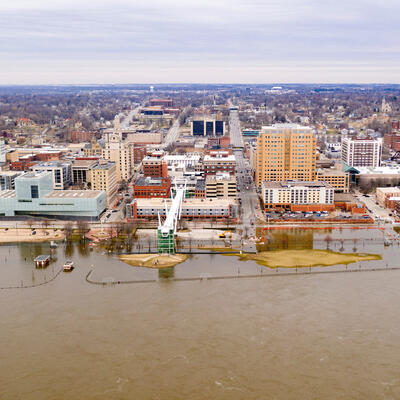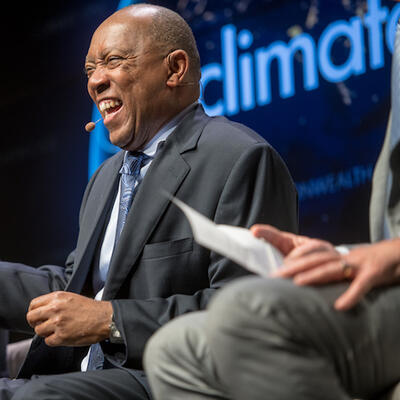
Weathering the Storm: Mayors of Houston, Miami and Columbia
Guests
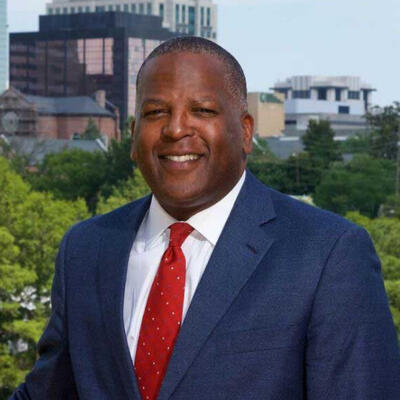
Steve Benjamin
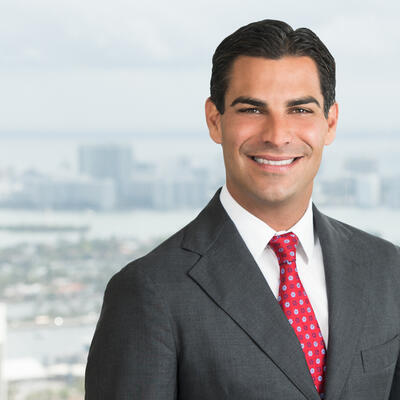
Francis Suarez
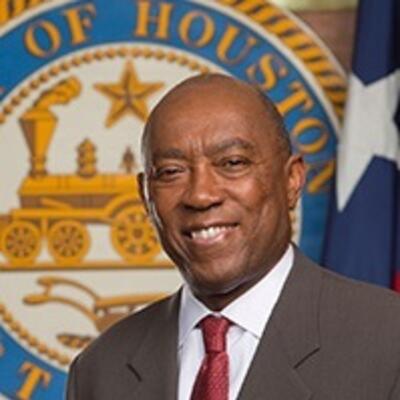
Sylvester Turner
Summary
2017 brought a raft of extreme weather disasters costing the U.S. hundreds of billions of dollars in damages, including hurricanes Harvey, Irma and Maria. And those are just the ones with names – other areas of the country were hit by floods, fires and drought. How do we fight back? The mayors of three cities on the frontline of climate change – Houston, Miami and Columbia, South Carolina - discuss what their cities are doing to recover, rebuild and prepare for the next mega storm.
Full Transcript
Announcer: This is Climate One, changing the conversation about energy, economy and the environment.
Today, we hear from the mayors of three cities that are coping with the environmental and economic fallout caused by extreme weather events.
Francis Suarez: Eighty percent of the city was without electricity after Irma…you know, on day nine it gets real. You know, I mean it’s like the program Walking Dead.
That’s Miami mayor Francis Suarez.
U.S. cities were pummeled by hurricanes, floods and fires last year. As federal disaster funding is stretched to the limit, cities are left to pick up the slack. But Houston mayor Sylvester Turner has a message for congress:
Sylvester Turner: Don't just provide us with enough funding to put us back where we were prior to Harvey. What we are needing now is funding to build a much more resilient city because there will be another storm, okay. Climate change is real.
Announcer: Weathering the storm. The mayors of Houston, Miami and Columbia. Up next on Climate One.
Announcer: Climate change is wreaking havoc on our cities – how can we fight back?
Welcome to Climate One – changing the conversation about America’s energy, economy and environment. Climate One conversations – with oil companies and environmentalists, Republicans and Democrats – are recorded before a live audience, and hosted by Greg Dalton.
2017 brought a raft of extreme weather disasters costing the U.S. hundreds of billions of dollars in damages, including hurricanes Harvey, Irma and Maria. And they’re just the ones with names – other areas of the country were hit by floods, fires and drought.
On today’s show, we’ll hear what the cities of Houston, Miami and Columbia are doing to recover, rebuild and prepare for the next mega storm. Our guests are mayors of three cities on the front lines of the new economic and environmental normal. Steve Benjamin is mayor of Columbia, South Carolina. In 2015, historic floods hit the Columbia area, killing 19 people and causing more than $1 billion in damage.
Francis Suarez is the newly-elected mayor of Miami. He took office in the aftermath of Hurricane Irma, which devastated South Florida and caused more than 100 deaths. Houston Mayor Sylvester Turner was in the national spotlight when Hurricane Harvey dumped an unprecedented fifty inches of rain on the city.
Here’s our conversation about steering America’s cities into the future.
PROGRAM PART 1
Greg Dalton: Mayor Turner, let’s begin on August 25, 2017 when a mega storm is making landfall in Texas. You're facing decisions to evacuate or not, you have to be thinking about the ghost of Katrina. So take us back to that day and what you are thinking about and just where you were on that day.
Sylvester Turner: On August 25th, I was at HEC, Emergency Center, our command post. In fact we were watching, monitoring the storm very, very closely. A couple of days before we didn’t quite know where it was going to hit. And then they informed us that it was going to hit not along the Houston area, but further down South. And it was not going to be the hurricane hitting Houston, Harris County area it was going to be a water event for us. A lot of rain but didn’t really anticipate how much. It was no time to try to evacuate anyone. When the city did evacuate back in 2005, number one if you’re gonna evacuate there’s a lot of preparation that you have to take into a place, you gotta make sure that there’s adequate fuel supply along the evacuation routes. When we did it in 2005, about 120 people died on the freeway because the freeways were like parking lots you literally could go and get you a hamburger, come back and you were still in the same place.
So we decided to keep people in place but we have some pre-position shelters just in case we needed them. On Friday, the hurricane landed by 10 PM. On Friday, things were good in Houston, Harris County. On Saturday, things were still pretty good. On Sunday at about 5 PM the national weather report indicated to us there were three bands coming in and each one of those bands would carry anywhere between 7 to 9 inches of rain. That's when we knew things were going to get bad. And so it was at that point in time we started getting people out of the low-lying areas and getting them into shelters. The first band came through; they were right, 7 to 9 inches. Second band came through, another 7 to 9. The third band came through and that's when water came out of all of the bayous and that’s where the heavy flooding took place.
Greg Dalton: And were you thinking about climate at that time or you didn’t have time to think about why, you’re just thinking about boy, we gotta to deal with this water and these people. Was there a climate connection to it at that point?
Sylvester Turner: Yeah, there’s a climate connection. Just to start there, I mean, you know, anybody who’s, I mean, keeping up with all of this knows that we have a climate problem, you know, it’s real, the science is real. So it didn’t just become real on August 25th it was real before. Bear in mind in the city of Houston we flooded in 2015. It was the Memorial Day flood. And then on April 17th of 2016 --
Greg Dalton: Flood Day.
Sylvester Turner: It was the Tax Day Flood. And then this one here on August 25th of course was Harvey and more rain fell on the city of Houston and the region than in any other city at any point in time in United States’ history. And it ended up being the second most costly storm, natural disaster for the country.
Greg Dalton: Yeah, it’s tied with Katrina I read.
Sylvester Turner: Right.
Greg Dalton: Mayor Suarez, you came into office in November and in your victory speech the night you won election you talked about jobs, transit, crime, housing and climate. I don't think many mayors mention climate in their victory speech.
Francis Suarez: Yeah, you know, we are Ground Zero for resiliency and climatic events that affect our quality of life. And I think what we’re seeing is other parts of the world and other parts of the country are using that as sort of a counter brand against the city of Miami. And so they're saying, you know, yeah the city is great the low taxes, whatever, but don't go there because you’re gonna be underwater. And so as mayor and as a father, you know, I have a four-year-old and a baby girl that's on the way, you know, certainly it's a concern that, you know, that impacts us on the short-term and impacts us in the medium-term, and certainly of course you wonder and you worry about the existential threat to the long-term viability of the city.
So, you know, for me I felt and I sort of we passed right in my election what they call the Miami Forever bond which was in part a resiliency bond where our voters did something very unusual, they voted to tax themselves. Because the issue is so acute and it's so macro that, you know, they voted to create $200 million of resources for us to begin meaningfully dealing with our climatic events which include a range of things from king tide flooding to tidal surge during hurricanes to annual rainfall that is significantly greater than what we've experienced or what we have a capacity to experience. So I think any mayor responsibly should have made this and should make this a major priority, particularly if you’re the mayor of Miami.
Greg Dalton: Mayor Benjamin, tell us how climate is it only sort of these frontline cities that are thinking about climate change Miami, Houston, you know. As we look around the country, where does climate rank in terms of traditional concerns for mayors, potholes, jobs, housing?
Steve Benjamin: It ranks very high. Climate mayors caucused, well over 300 mayors signed up. I’m also helping lead as one of the co-chairs of the mayor of Salt Lake City and the mayor of San Diego and Mayor Suarez is a former neighbor, the former mayor of Miami Beach, Philip Levine, mayors for 100% clean energy, those of us who are committed they’ll be ready for 100 by 2036. I see the crews here with us here tonight. We’re making commitment to clean and renewable energy. We’ve been joined by 200 of our colleagues all across the country who recognize, you know, the reality what you hear from Mayors Turner and Suarez is that Washington DC may dilly dally at times and some of that dysfunction has the state government policymaking or the lack of policy-making. But mayors have to get the job done every single day and that’s regardless of party, regardless of geography.
In my city, our council voted unanimously, we vote unanimously on almost nothing I might add, unanimously to invest in new storm water infrastructure, $100 million to address our top problem areas in our city. We’re gonna issue our very first green bond, you know, in the heart of the old south a deep red state. So mayors are working across party lines, arm in arm to try and deliver solutions and trying to put some of these major challenges in people speak every single day. And I would tell you that our citizens are a lot smarter than people think they are, a lot more engaged and certainly care a great deal more about preserving the earth that we've inherited, but as Mayor Suarez mentioned, protecting it for our children yet to be here.
Greg Dalton: So 2017 was the most expensive year in U.S. history in terms of major events driven by climate change. Former New Jersey Governor Christine Todd Whitman joined me on stage and she said that cities and states may not be able to rely on the federal government for disaster relief funds.
[Start Clip]
Christine Todd Whitman: Uncle Sam is out of money and we have a federal deficit that was going out of sight. So we are already in that position. I mean we do have to start looking at our priorities again and assessing where it is we’d want to spend money; what are the things for which the federal government is responsible. What’s gonna fall solely on the states and what’s gonna be up to the individual and local government and the individual. But as far as when do we run out of money, we’re there.
[End Clip]
Greg Dalton: That’s former New Jersey Governor and former EPA chief under President George W. Bush, Christine Todd Whitman. Mayor Turner, Texas still wants, I think, $61 billion from the federal government to rebuild after Hurricane Harvey. What’s the status of that and what are your comment to Governor Whitman saying Uncle Sam is not gonna keep writing these big checks.
Sylvester Turner: Well, to keep from writing big checks it’s important for cities to be built stronger and more resilient, otherwise whatever funding you get you’re providing funding for failure. There's no question right now what the Senate passed out today a package of $89 billion, but I think that's for California, Texas, Florida, Puerto Rico and the Virgin Islands. So that’s not nearly enough when you divide it up. Let me just say for us and what I've said to people in Congress is that don't just provide us with enough funding to put us back where we were prior to Harvey. What we are needing now is funding to build a much more resilient city because there will be another storm, okay. Climate change is real. We faced a 500 flood in ‘15, ‘16 and ‘17. So there will be another storm. What we are needing now is to make sure that our city is more resilient. We are built on the bayou city and so we have to provide more capacity on our bayous, we have to put more detention bases in place. There is a need for example, a third reservoir in parts of Houston.
If the hurricane had hit Galveston Bay and there had been a huge storm surge then that water would've come back up into the city of Houston and it would have been horrific. The Port of Houston, for example, is not just important to the city of Houston, or the state of Texas, but is important to the country as a whole. You know, a large percentage of the fuel that's refined that comes out of the port supplies areas throughout the country. So it’s important and we are advocating for what we call the coastal spine something that they put in the Netherlands that would help to prevent the storm surge. It is a huge cost, it’s about a $12 billion item but assume that the storm hurricane had hit Galveston Bay it would've been exponentially more.
And so if they simply provide enough funding to put us back where we were prior to Hurricane Harvey then you’re providing funding for failure. One example, there is a multifamily unit that’s built on the bayou. It caters to low income tenants. It flooded in ‘15, the owners went to HUD, they got funding it was rebuilt. It flooded in ‘16, owners went to HUD; it was rebuilt. It flooded in ‘17 they are going to HUD and I've put a tag on it saying it makes no sense to provide funding that benefits this developer when you’re serving low income tenants they are the ones who are displaced but the owner of it is not losing out on anything. So that's funding for failure. So there are things that need to take place to make us more resilient. And I don't want to necessarily hear all the language about running out of money. What did they just do a couple of months ago?
Greg Dalton: Added $1.5 trillion to the national debt.
Sylvester Turner: To the national debt. But I think if you recognize that the climate is changing so on the Houston level locally, what are we doing? Houston purchases more solar power than any city in the country. We are going to meet that goal of hundred percent on renewables, we’re looking at additional --
[Applause]
-- we’re looking at additional ways more parks and green space. All of those things are critically important that would have a significant impact. I've said to developers we’re not going to continue building in the city like we've done before.
This is a new day and so doing the same thing and not expecting people to flood makes no sense. So we're changing that. And we’ll have a serious debate on that before the month is over. But the federal government has a role to play. You stop the cities, you stop the country.
Greg Dalton: I spoke with Rolling Stone contributing editor Jeff Goodell about the financial impact sea level rise will have on communities and danger zones.
[Start Clip]
Jeff Goodell: The thing about sea level rise is it doesn't have to be gargantuan to have enormous problems with beaches washing away, with roads eroding. The costs for communities to deal with this, property values declining at exactly the time when they need to spend more money on adaptation. The economic kind of downward spiral that can be caused by even modest amounts of sea level rise is hugely consequential and will begin to play out long before these big numbers get hit and even in the next few decades. Even now we’re seeing it in places in Florida where, you know, they’re spending instead of $10 million every two years to replenish the beaches they’re spending $50 million. Where is that money coming from?
[End Clip]
Greg Dalton: That's author of the book called The Water Will Come, Jeff Goodell from Rolling Stone. Mayor Suarez, you mentioned that your residents have taxed themselves for 200 I thought it was 400, that's still a drop in the bucket. Where is the more money gonna come from to replenish the beaches and as Jeff Goodell said when property prices start to go down that hurts your tax base just when you need it most.
Francis Suarez: Sure. And, you know, we’re already living with some of these climatic events. And so for us it's not about a debate as to whether sea level rise is a true or not true phenomenon or to what extent it's going to affect us. We have a very porous subsoil. So we have water that percolates upward in king tide flooding.
Greg Dalton: So a levee is not an option -- seawall is not an option for this.
Francis Suarez: Seawall alone is not an option. I think, you know, what happened in Miami Beach did a fairly good job, but I think they did it under what I call sustainability 1.0. We’re sort of learning from Miami Beach. They did some things that we think are replicable and some things that we think were mistakes. And so, you know, you have to learn from that. I think everything in life and dealing with a problem, a macro problem such as this, happens in phases. So we’re blessed to get from the legislature a little over $1 million to update our storm water master plan to take into account sea level rise. That was sort of the first thing that we did. And then we got our resiliency -- it was a $400 million package but it was not all dedicated to resiliency. It was 200 for resiliency, a hundred for affordable housing and a hundred for cultural facilities, which are part of really the resiliency concept it’s not just a climatic concept. It’s a concept of having a city that is more resilient to all kinds of shocks. You know, one of the things that we saw during Hurricane Irma was just how fragile our electrical grid was. And I mean obviously, you know, when you see what's going on in Puerto Rico, you know, where they have, you know, been without electricity for months. The city of Miami 80% of the city was without electricity after Irma. And it took about 12 days for us to get back to about 90%, 95%.
But, you know, on day nine it gets real. You know, I mean it’s like the program Walking Dead. I mean, it’s really, really, people are at each other, you know, by that point food has spoilt. If you don’t have a generator and a lot of our poor areas, you know, people don't have generators; I mean I gave my generator away to a public housing project where they'd relied on electricity to power their wheelchairs to get to the third-floor apartment. So, you know, for us we’re dealing with this phenomenon, but I do agree that $200 million is a starting point.
And I think, you know, when we start analyzing this problem in a way that is reflective of the fact that other cities have begun trying to address this issue, we realize that it's a much more pervasive and comprehensive problem which is gonna require much more comprehensive solutions. We, after Hurricane Andrew, I always say, you know, we became, we gave the world the gift of wind resiliency after Hurricane Andrew. Hurricane Andrew had sustained winds in excess of 200 miles an hour. And we changed our building codes and all our buildings built post-Andrew can sustain, you know, incredible wind loads. But our new challenge is to be the most water resilient city on the planet. And I think you know post Irma we saw tidal flooding or tidal surges that went 4, 4 and a half, 5, 6 blocks and with 3 and a half foot of flooding. Now, the good news was that a lot of that water receded fairly quickly. But it still highlights how dramatic the problem can be and how much damage it can cause to your city.
Announcer: That’s Miami mayor Francis Suarez. You’re listening to a Climate One conversation about how America’s cities are facing up to climate change.
Coming up, getting past the politics.
Steve Benjamin: We have to keep pushing because some of the dysfunction we’re seeing in Washington…is really seeping down in our state government.
Announcer: Up next, when Climate One continues.
Announcer: We continue now with Climate One. Greg Dalton is talking with three mayors who are steering their cities through stormy waters following a year of extreme weather. His guests are Steve Benjamin, mayor of Columbia, South Carolina, Sylvester Turner, mayor of Houston, Texas, and Francis Suarez, mayor of Miami, Florida.
PROGRAM PART 2
Greg Dalton: So Mayor Benjamin, let’s talk about the political level of this, you know, how does the conversation that happens, you know, in your city compare with statewide? It wasn’t your state but it was a state nearby that tried to outlaw climate change famously once. So how does it trickle up to the state level?
Steve Benjamin: Well, every state is obviously different. It's fantastic when you sit here and you listen to these two men and I will tell you it's consistent across the country. And you talk about these major issues you don't know if you’re talking to a Republican right now, okay. Because mayors are just about solving the problem that's what we do we solve problems. We solve them differently in 2018 than we might have 20 years ago, but what you hear here is you hear depth of experience from experienced state policymakers and local policymakers who are just about getting the job done.
I want to step back just for about 20 seconds to your previous question you asked, Mayor Turner. 85% of all the people in this country live in cities in metropolitan economies, 89% of all jobs. 91% of America’s nearly $20 trillion GDP is created in cities and metropolitan economies. Mayor Turner boasted a GDP larger than that of the country of Sweden. Francis Suarez, Miami has a larger GDP than Hong Kong, okay. I mean we’re talking about the mayors that we have out here this week interfacing with the tech community represent 10% of America's GDP I mean in one room. So when we go to Washington, that’s a long way of saying, when we go to Washington and we’re talking about repatriating tax dollars back home -- because that’s what we’re talking about.
This is not going to Washington asking for money to come back to save Houston. Houston sent that money to Washington. We’re not talking about asking Tallahassee to send money back to Miami. Miami is driving the Florida economy. I mean, so we’re talking about how do you make smart investments and now while we’re out here we’re talking about how do you invest in true urban resilience that helps us respond to and recover from but even more importantly, how do we start using this incredible focus on, I mean, we’re in this bubble in Northern California right here we’re talking about the bill to use real data and predictive analytics and just the advent of AI. What can we start doing together to help us all make smarter, strategic investments on the front end to help prepare for and respond to these things on the backend. But it's important to note that the resources, as I had to tell a senator from another southern state just a few months ago, the money is not falling from Washington DC like manna from heaven. It got there because our taxpayers sent it there and we want it to come back home.
[Applause]
And to use it in a way that’s smart. But this dialogue is happening with mayors all across the country of all stripes, all shapes and sizes, partisan backgrounds. And we have to keep pushing because some of the dysfunction we’re seeing in Washington, some of the bad policymaking is really seeping down in our state government. But when you have events like this regrettably, when you have events like we all have had, it starts pushing some people in our state capitals. Our City Hall is four blocks from our state capital. They start thinking a little more wisely because obviously their constituents our mutual constituents are feeling the pain and they’re pressing them to make better policy.
Greg Dalton: Let’s ask that. Mayor Suarez, Rick Scott, you know, known to doubt climate science apparently said, didn't want the word mentioned in state official documents. What kind of movement has there been among the Republican delegation in Tallahassee or in Washington on climate after Irma?
Francis Suarez: You know, from my perspective I was sort of pleasantly surprised that the Republican legislature did fund our upgrade to our storm water master plan. And that it survived the veto plan. I was frankly a little shocked, pleasantly shocked. But it allowed us to begin the planning process of how do we spend these dollars in a way that is the best expenditure because obviously we have a fiduciary duty also to our residents to make sure that we spend dollars effectively and efficiently to deal with and address these issues. But as Mayor Benjamin was saying, you know, we just don't have the luxury of looking at the world that way. You know, for us it's really problem solution and so my responsibility as a Mayor is to go up and educate the state legislature or the governor whomever the governor or legislators are and tell them these are our problems. We are major tax generators and we deserve an investment.
And I think the other thing is that a lot of these climatic issues are changing the conversation because it's an economic conversation. And I think once you make it an economic conversation I think you depoliticize it a little bit, you departyize it a little bit and you make it about return on investment and you make it about what are the risks, the economic risks involved. When we’re growing at the level that we’re growing, we’re talking about $1 billion of new real estate a year for the last few years. So that is, I mean, that’s the exposure on that kind of, those kinds of assets, you know, should worry any conscientious-elected official.
Greg Dalton: Mayor Turner, you came from the state legislature in Texas. You know, how has Harvey changed the conversation. Greg Abbott the governor of Texas is not particularly inclined to talk about climate change. Do you talk about it in different language as Mayor Suarez was saying?
Sylvester Turner: I don’t know if we talk about it in different languages. I think climate change has a way of making things bipartisan. And what I mean by that when we flooded in 2015, there was certain geographical areas that were flooded primarily in your poorer areas. The Tax Day Flood on April 17, 2016 same, about the same. And so there were other areas that were still high and dry, but Harvey said, let me be indiscriminate. And so when Harvey came and 51 inches of rain fell. If you were in poor neighborhoods, you were already on the margins you got pressed down, you’re flooded. If you were in the affluent communities, you’re really flooded. So from the northwest to the northeast side of town, you’re flooded. It didn't say you are a Republican neighborhood, so we’re gonna bypass you. It came down. And so now you have all of these families and all of these neighborhoods that have been adversely affected and they don't want to flood again. And then you want the city to continue to grow. You want people to continue to be proud of where they live. You want people to come. Houston is the energy capital of the world, a lot of oil and gas companies. But at the same time, you have a lot of oil and gas companies in the city of Houston that recognize that we need to focus now on renewables.
That we need to do some other things to be more resilient because we still want people to come and be a part of our city. And that's a good thing. So from my vantage point, what I say to people and to the, you know, yes, city of Houston is a blue city, but if you take the blue city out of the red state then you come to a standstill. And we have to focus on results. It’s all about results and meeting people's needs. So I think the reality is because of Harvey on so many levels people recognize that you cannot ignore things any longer. Their constituents are not going to allow them to ignore things and we have to build a much more resilient city. And if they don't help us to build a more resilient city, it’s their constituents that’s gonna hold them accountable for that.
Greg Dalton: I spoke to a former president of an energy company based in Houston, very large, who did not vote for you, but said he probably will next time because of the way you handled Harvey.
[Applause]
We’re gonna go to our lightning round. It’s time for our lightning round, a series of short questions with shorter answers. And the first round is association. I’ll mention a name or a person and just get your first reaction, unfiltered with complete disregard for what people might think about. So first for Steve Benjamin, the first thing that comes to mind when I say Florida Governor Rick Scott.
Steve Benjamin: It’s Francis’ problem.
[Laughter]
Greg Dalton: Mayor Turner. South Carolina Governor Henry McMaster.
Sylvester Turner: Oh, that’s Mayor Benjamin’s problem.
[Laughter]
Greg Dalton: Okay. Mayor Suarez. EPA administrator Scott Pruitt.
Francis Suarez: Never heard of him.
[Laughter]
Greg Dalton: Mayor Turner. Energy Secretary Rick Perry, former governor of Texas.
[Laughter]
Sylvester Turner: Former governor.
Greg Dalton: Mayor Benjamin. Dreamers.
Steve Benjamin: Make America great.
Greg Dalton: Mayor Suarez. Muslim ban.
Francis Suarez: Terrible.
Greg Dalton: Mayor Turner. Offshore oil drilling.
Sylvester Turner: Not good for the future.
[Applause]
Greg Dalton: This is a yes or no portion for our three mayors. Mayor Benjamin. Yes or no. Coal is dying a slow death?
Steve Benjamin: Yes.
Greg Dalton: Mayor Suarez. You support efforts by New York and other big cities to divest from fossil fuel companies?
Francis Suarez: Absolutely.
Greg Dalton: Mayor Turner. You support divestment from fossil fuel companies?
Sylvester Turner: Yes. By the way, I think coal is dying fast death, not a slow death.
Greg Dalton: It’s tough for those companies for sure; it’s tough for those workers. Mayor Suarez. Yes or no. Climate change is a moral issue?
Francis Suarez: It is a moral issue.
Greg Dalton: Mayor Turner. Yes or no. The Texas Legislature is famous for not doing much?
[Laughter]
Steve Benjamin: I’ll take that answer. You can either confirm or deny though. It’s gotten a lot less productive since he left, I’m sure.
Greg Dalton: They actually like it that way. They don’t mean often, it’s a point of pride.
Sylvester Turner: That one is relative. That’s relative.
Greg Dalton: Mayor Benjamin. Suppose a relative bequeathed you $1 million. Would you spend it on an oceanfront condo in South Florida?
Francis Suarez: You couldn’t get one for a million dollars.
[Laughter]
Steve Benjamin: Let the record reflect that I don’t own anything, my wife owns everything.
[Laughter]
And I’ve gotten used to it. I got used to it. But I would tell you South Florida is her happy place.
Francis Suarez: By the way he would vote for me if he did buy a condo.
Steve Benjamin: I would.
Greg Dalton: Mayor Suarez of Miami, would you rather have an oceanfront home in South Carolina or Texas?
Francis Suarez: I don’t know. I wouldn’t know the difference. They both sound like wonderful places.
[Laughter]
Greg Dalton: Okay last one for Mayor Turner. The best place in the country to have an oceanfront home is California?
Francis Suarez: False.
Sylvester Turner: Well, I'm here in California of course. Yes.
[Laughter]
Greg Dalton: So you’re saying that’s right. That ends our lightning round. Let’s give them a round of applause for making it through the gauntlet.
[Applause]
Announcer: You're listening to a conversation with three mayors on the frontlines of climate change. When we come back, how their cities are preparing for a clean energy economy.
Sylvester Turner: We do need to make changes. And coming from Houston, the energy capital of the world, we recognize that you can’t just continue to do things the same old way.
This is Climate One.
Announcer: You’re listening to Climate One. Today, Greg Dalton is talking with Houston Mayor Sylvester Turner, Miami Mayor Frances Suarez, and Columbia, South Carolina mayor Steve Benjamin. Let’s continue with their conversation about building climate-smart cities and greener economies.
PROGRAM PART 3
Greg Dalton: You’re here three mayors of Columbia, South Carolina, Miami and Houston, meeting with tech companies. Mayor Suarez, the future of cities is in flux right now with all this talk of autonomous cars clogging our streets. Silicon Valley wants us to think it's gonna be utopia, it’s gonna be wonderful, it’s gonna reduce pollution and we’ll have more time. How are you thinking about the future of Miami in a world with robotic cars running around?
Francis Suarez: I think that's the tip of the iceberg in terms of the disruptions that we’re feeling as cities. My personal belief is that we are in a very near-term future, every car is gonna be electric. I believe that. I think most if not all cars will be autonomous and I also think that a lot of, some of the problems that have plagued us for many, many years the solutions will be things that we don't really particularly anticipate. For example, we have 2.8 million people in Dade County, 2.1 million have driver’s license and each person with a driver’s license basically has a car on average in the city. What I think is gonna happen in Miami is people are going to start working either from home or from a co-working space near home. So they probably won't have to get in a car to go to work to begin with. That decongests our road significantly. Certainly it improves our carbon footprint dramatically.
But I think when you consider the fact that we’re gonna have electric vehicles I’d say in the next, you know, predominantly in the next 36 to 48 months and we’re gonna change the way that we behave in terms of where we work. I mean, the most ubiquitous thing every person in this room I promise you, has the ability to teleconference from their phone. Every single person in this room, there’s not one person in here that cannot do that. So to me it seems almost irrational at this point that we all get up in the morning, get in the car and drive at the same time to a place of work. I mean, it almost seems like a very rational decision. But I really think that in the near future we’re gonna radically change and I think that's only gonna make cities more vibrant. I kind of agree with Mayor Benjamin and certainly Mayor Turner that, you know, the vibrancy of cities is what's propelling this national economy. And I don't see threats I think I see opportunities.
Greg Dalton: Mayor Turner. Houston is a city built on sprawl obviously energy capital, a lot of oil and gas there. Is the car the future and how is Houston gonna be more or less car centric city? That's a pretty big transformation of land-use and everything else.
Sylvester Turner: Right. We made some choices in the 1990s that we are having to deal with today. In the 1990s we decided we were going to build roadway capacity and we did. And if those who are familiar with city of Houston the 610 loop and then there's the Beltway like a loop and then there’s the Grand Parkway. And as we have built them they have come and the congestion is still there. What we've decided now and is a part of climate change and flooding and everything else is that the transportation system now has to change. And when I came into office in January of 2016, I said we needed a paradigm shift. And so the focus now has to be on multimodal form of transportation. We have to provide people with a lot of different options. We have to be much more aggressive and whether it is light rail or BRTs or you name it. We have to move in that direction. We have to design and construct a city that’s more walkable, pedestrian friendly. So we have to change the design on how we’re approaching things.
We just had an announcement the other day, Monday, with regards, for example, to the high speed bullet train going from Houston to Dallas. And so we're moving forward and the construction is scheduled to start in 2019 on that. So the reality is that we have to make some changes not just for transportation, but so much of transportation is tied to how we develop and how we deal with the issue of drainage and flooding and whether or not we're going to be a stronger and more resilient city. And so that's important. We still want people to come. We are a growing city. We want to continue to grow, but instead of sprawling, you know, we’re looking at doing some other things. And like I said in terms of how we’re going to develop and build in the city, those rules are now changing as well.
Greg Dalton: Mayor Benjamin of Columbia, South Carolina. Density is good for reducing greenhouse gases, reducing traffic, but getting to density it means getting across NIMBY. We know people don't like high-rises in their neighborhood. So how do you convince people that density is good when they don't want more people in their neighborhood, they don't want high-rise blocking their light that sort of thing. That’s a tough sell.
Steve Benjamin: You know, I think this is one area in which mayors are uniquely able to dialogue with our citizens. You know as I visit our friends in Washington where I know all three of us spent a great deal of time on a regular basis, sometimes it seems like the discussions they are just removed from reality. I see our citizens in church and when we visit a synagogue or a mosque, I see it at the grocery store; it’s a traffic light I get advice and counsel from our citizens. The ability to talk about tough issues is sometimes lost in some of our federal representatives. I can talk to our citizens about hundreds of thousands of new jobs and clean energy. I can talk to them about how we help their children deal with asthma, the opportunity to lower their power bills by dealing with solar energy. We can talk about the benefits of vertical development and what it means in terms of tax base that this one building, this one 300,000 square-foot building downtown produces more tax revenue than a 300-unit subdivision in the outskirts of town without the environmental disruption, physical disruption to build infrastructure to get there. And by the way 63 cents of every dollar that comes in goes to the school district to help provide opportunities for kids all across our city.
There’s an argument around about urban smart sound, dense urban development surrounded by strong neighborhoods and in cities like ours in 15 minutes you could be in the rural hunting for boar or fishing for bass if you want to. But these are arguments to be made, but that's a face-to-face conversation that mayors have every single day. And I think we tend to be uniquely qualified to have those conversations.
Greg Dalton: Mayor Sylvester Turner of Houston. I have to admit I was surprised when I saw that you are leading a group of mayors supporting the Paris climate accord being, you know, Houston, oil and gas companies, a lot of those oil and gas companies are trying to slow down the transition to a clean energy economy. So why are you back in Paris, supporting the Paris climate accord that the U.S. is now trying to walk out of?
Sylvester Turner: Well number one it’s the right thing to do. That’s number one.
[Applause]
And number two, we all want to leave a world better than the world that we inherited, okay. And so that's important. The science is real. We do need to make changes. And coming from Houston, the energy capital of the world, you know, we recognize that you can’t just continue to do things the same old way and expect something different. That's not going to take place. And so it’s in all of our best interest. And quite frankly, when you look at renewable energy and solar there are more jobs created in that arena than in the old traditional arena. And then when we look at the fact that we all are trying to build a more resilient city, what we want in the city of Houston, we want a stronger and more resilient city.
And I don't think there's a better place to be able to make the argument that you can be the energy capital of the world and you can also place a great deal of emphasis on recognizing that there is climate change and looking at alternatives and making your city stronger and resilient. And the two don't necessarily have to be at odds with one another. And that's what we're trying to demonstrate in the city of Houston.
Greg Dalton: Mayor Suarez, a lot in your Party, Republicans are doubting Paris, trying to pull out of Paris. Where are you on Paris and how is it relevant to Miami?
Francis Suarez: I'm very much in favor of being a completely energy independent city. I think that we’re going there irrespective of what anyone believes. And the reason why is because before it used to be sort of an existential environmental argument, and I think now it's becoming an economic argument. I mean, you have a situation where the largest power plant in the solar system is the sun, and so, you know, our ability to harness that power is becoming so inexpensive that it would be foolish for people not to do it. I mean, at this point, you know, and then by the way not only that, but I supported a program in Miami called the PACE program which allows you to do energy-efficient retrofits to your home and put in your tax bill and it pays for itself. So you put solar panels on your home, we’re a very sunny city obviously so, you know, I can't speak for every city in the United States. But you put solar panel in your home and you are almost essentially off the grid. And that's irrespective of the fact that there is no battery capacity right now.
I mean once battery technology, you know, comes on board and you can store energy in your home, I mean, it's game over. I would not be investing in gasoline companies or oil companies, I wouldn't. I would not advise anybody to invest any money with all due respect to my mayor. I just think it's not even about at this point fortunately or unfortunately, however you want to look at it. It just so happens that it's a great environmental argument, but the economics of it are so dramatic that I really feel that -- and so I think it's a beneficial thing because obviously we as a city and I think as a country and as a world want to be harnessing energy that is renewable and harnessing energy that is not gonna negatively impact our ability to live. So we’re trending in the right direction and I'm in favor of it, of course.
Greg Dalton: We are talking about climate change in American cities at Climate One. I'm Greg Dalton. My guests are Sylvester Turner mayor of Houston, Francis Suarez mayor of Miami and Steve Benjamin mayor of Columbia, South Carolina. Let’s go to our audience questions. Welcome to Climate One.
Male Participant: So I'm David Capelli. I actually am from Miami-Dade. I served the county mayor, Carlos Gimenez on his board of millennials policy board; I wanted to ask each of the mayors here. How are you engaging and working with diverse millennials on these poignant issues so that we have more diversity and actually solving these problems for the most vulnerable populations in each of your cities?
Greg Dalton: Who would like to tackle that first? Mayor Suarez.
Francis Suarez: I’ll start. I was actually invited by the conference a couple weeks ago to speak on a millennial mayor’s panel so I didn't realize that I was still a millennial. I’m 40. So I don’t know, I think I’m on the cusp. And I think everybody on my staff is a millennial, my mayor staff. And I think, you know, I forget who was saying it, you know, technology and the knowledge-based economy is sort of the macroeconomy of where we are right now. And so as a city we are in a global competition for survival in that reality. And so I think, you know, as mayors we have a duty to pay attention to all the different segments of our society. I think you get a tremendous amount of wealth of knowledge and energy and ideas from the millennial generation.
And so I probably have taken a little bit of heat as mayor because all my entire staff is millennials essentially. But the truth of the matter is they’re very hard-working, idea-driven, passionate generation. So it’s certainly inures to my citizen’s benefit. And so that interaction is daily for me.
Greg Dalton: Mayor Turner.
Sylvester Turner: Yeah. I think it’s important you have to include millennials at the table of decision-making. I know when I ran for office, my daughter who is 30 years old and said, dad when you become mayor don't forget about us. You know, you can’t talk about building a city for the future, when the future is now sitting at the table today. And I take that very seriously. And so a part of what I've done, a significant part, is to place millennials at the table of decision-making so that they can advocate and include their ideas. There’s a millennial conference, for example, in the city of Houston that’s taking place on this coming Saturday which I look forward to being a part of that and being with them. And again, you know, what I say to people is that from age-wise I may be a little bit older than Mayor Suarez.
[Laughter]
But that doesn't mean you don't have ideas that can relate and be a part of the millennial generation. But you have to include people -- you can be diverse, but diversity doesn't necessarily mean in terms of ethnicity or language or religion. Okay? Diversities come in many different forms and you have to include that diversity at the table of decision-making so that they can advocate for themselves.
Greg Dalton: Let’s go to our next question. Welcome to Climate One.
Female Participant: Thank you. So this question is for Mayor Benjamin, although given Mayor Turner’s comment on 100% clean energy tonight, I invite all the mayors to respond. Columbia recently became the first city in South Carolina to commit to 100% clean energy by 2036. Why was it important for Columbia to make this commitment and what message would you share with mayors across the country as to why their city should join Columbia in making a commitment in a just and equitable transition to 100% clean energy.
Steve Benjamin: You know, we relish the idea of being a state capital in a state where you don’t expect a lot of progressive thought. And so whether it's banning bump stocks or being the first state, city to ban texting while driving or making this commitment to 100% clean energy. It's amazing when we stretch with blueberry in this tomato soup; it's amazing how other cities then begin to follow. We have to model the type of behavior that we know that we ought to expect for all of the cities to follow. Both of my colleagues here are right on point. If America's cities lead and we lead our metropolitan economies and we do together, and we lead not just as municipal corporations that we are but recognize that these goals are meant to be citywide goals, that we’re doing this in partnership with our for-profit and nonprofit partners and public agencies. That working together with some of our wonderful institutions like the Sierra Club and others, we can do this. And we can do this and it won't be driven by bad policymaking of one administration or another, that together that American citizens can help change the world indeed. And we’re gonna keep doing it.
Announcer: Greg Dalton has been talking about the challenges of steering America’s cities into the future, with the mayors of three cities that have been hit hard by climate change.
Francis Suarez is the mayor of Miami, Florida. Steve Benjamin is mayor of Columbia, South Carolina, and Sylvester Turner is mayor of Houston, Texas.
To hear all our Climate One conversations, subscribe to our podcast at our website: climateone.org, where you’ll also find photos, video clips and more. If you like the program, please let us know by writing a review on iTunes, or wherever you get your podcasts. And join us next time for another conversation about America’s energy, economy, and environment.
Greg Dalton: Climate One is a special project of The Commonwealth Club of California. Kelli Pennington directs our audience engagement. Carlos Manuel and Tyler Reed are the producers. The audio engineer is Mark Kirschner. Anny Celsi and Devon Strolovitch edit the show. The Commonwealth Club CEO is Dr. Gloria Duffy.
Climate One is presented in association with KQED Public Radio.
